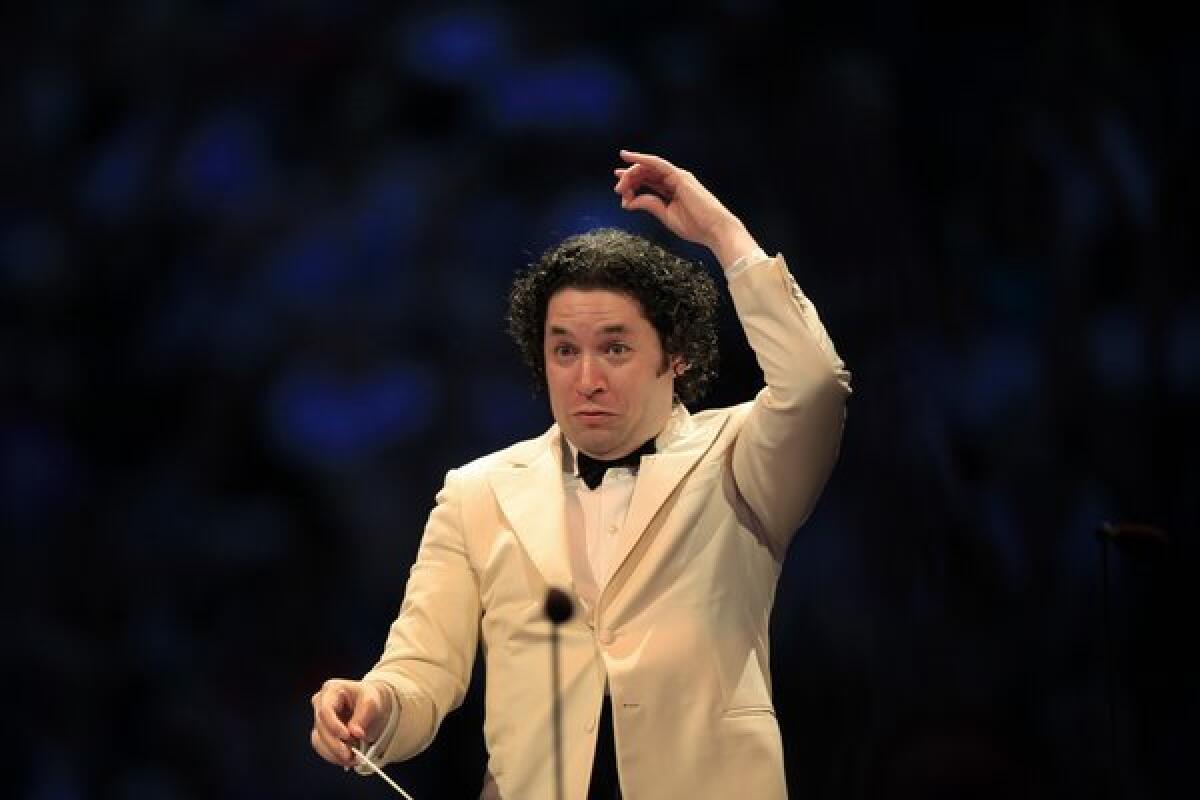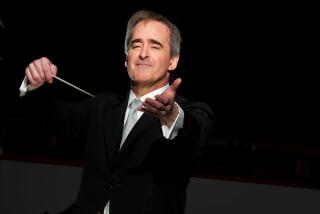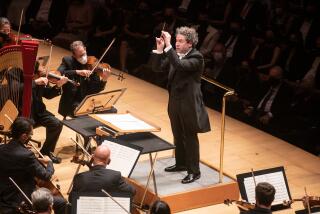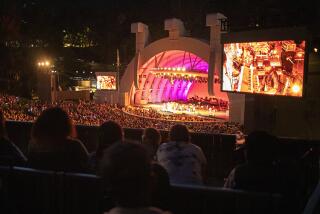Gustavo Dudamel is bowled over by the Bowl

In the history of music, certain artists always will be twined with certain venues: Charlie Parker and Birdland, the Apollo Theater and Ella Fitzgerald, James Levine and the Metropolitan Opera House.
The number of performers who’ve played the Hollywood Bowl is so long and venerable that no single name could dominate its legacy, not even that of the Fab Four. But over the last eight years, since he made his Bowl debut as a 24-year-old conducting Silvestre Revueltas’ “La Noche de los Mayas” and Tchaikovsky’s Fifth Symphony, Gustavo Dudamel has put his mark on the storied amphitheater many times.
“I’m very happy always to work there,” Dudamel said recently in his large, smartly furnished office at Walt Disney Concert Hall. “The atmosphere is unique.”
FULL COVERAGE: 2013 Spring arts preview
Dudamel, 32, said that some of his fondest professional moments in L.A. had occurred at the Bowl, beginning even before he became the L.A. Phil’s music director in 2009.
None was more memorable than his U.S. debut at the Bowl on a September evening in 2005. At the time, the Venezuelan maestro already was regarded as one of the world’s most promising young podium leaders, and that night, “The Bowl was said to be dotted with American orchestra administrators checking him out,” reported Times music critic Mark Swed. “All of this meant that he had a lot to live up to,” Swed wrote, “and for the most part he did.”
Slightly more than four years later, Dudamel was back as the Phil’s newly hired music director. The orchestra and the city rolled out a welcome mat in the form of an evening-long celebration, dubbed “¡Bienvenido Gustavo!” that featured guest artists such as actor Jack Black and bassist Flea of the Red Hot Chili Peppers, and, of course, Dudamel conducting the Phil.
PHOTOS: Gustavo Dudamel career in pictures
“The day of the welcoming was very beautiful. It will stay always in my heart,” Dudamel said. “It was so beautiful to see such an amount of people coming to say ‘welcome.’”
Another Bowl highlight for him, he said, was the multi-night “Americas & Americans” festival last August. One concert program mixed Mexican, Brazilian and Argentine orchestral works with Latin American pop music performed by some of the hemisphere’s Spanish-language pop luminaries.
“With Juan Luis Guerra, with Rubén Blades, with all of them, that was a big moment,” Dudamel said. “It was the chance to show that all music is one. It can be jazz, it can be merengue, bachata, salsa, classical, whatever. Music is one. And people connect that with their life. And that was very beautiful, it was very important.”
Another pan-American program that was part of the festival included works by Aaron Copland, Juan Carlos Núñez and Alberto Ginastera’s First Piano Concerto, with Venezuelan soloist Sergio Tiempo. As on previous occasions, Swed reported, the Dude once again seemed undaunted by the Bowl’s sonic idiosyncrasies (marauding helicopters, chiming wine glasses).
PHOTOS: Arts and culture in pictures by The Times
Dudamel said the Bowl also has given him and his orchestra a welcome yearly opportunity to perform semi-staged opera in a large-scale environment. This summer’s offering, in August, will be Verdi’s “Aida” with soprano Liudmyla Monastyrska performing the title role.
“Having the chance to do operas — ‘Rigoletto,’ ‘Turandot,’ now ‘Aida’ — I think it’s great conditions to do that, in the space,” he said. “It gives you the space to develop all these crazy ideas.”
Much as he loves the place, Dudamel will be on the Bowl’s podium but one week this summer, celebrating Verdi’s 200th birthday by leading “Aida” and two performances of the Requiem.
Dudamel, who lives with his wife, Eloísa Maturén, and young son, Martín, a few minutes’ drive from the Bowl, acknowledged that the city’s background buzz can be distracting in the middle of a soft classical passage.
“But you have to understand the times,” he said. “When they built the Hollywood Bowl there were not airplanes and helicopters around. Silence — it was more about that. Right now it’s a different city, it’s a different life. That is the thing of the Bowl: It adapts your life to the music.”
More to Read
The biggest entertainment stories
Get our big stories about Hollywood, film, television, music, arts, culture and more right in your inbox as soon as they publish.
You may occasionally receive promotional content from the Los Angeles Times.







